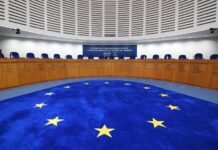Johannes Hahn, the European Union‘s (EU) commissioner for enlargement, said that he is seeking to reassess the EU‘s relationship with Turkey and hopes the debate will begin at a meeting of EU foreign ministers in Malta next week.
In an interview with German news agency DPA, Hahn has assessed the controversial referendum results in Turkey and commented that “We are concerned about the outcome of the referendum for two reasons. With regards to the planned constitutional changes, we share the very serious concerns of the Venice Commission of the Council of Europe. Secondly, the referendum has resulted in a deep split of Turkish society. If the plan for the constitutional changes is fully implemented, this means that the country is moving even further away from European standards with regards to the separation of powers and an independent judiciary.”
About Turkey-EU accession negotiations Hahn, underlined the negotiations have already come to a de facto standstill because of the massive regression in terms of rule of law and press freedom in Turkey and added that “Right now we can‘t open any further ‘negotiation chapters,‘ even if a large majority of EU member states did not want to formally freeze the negotiations.”
Hahn continued to say that “But after the referendum the time has come to start a fundamental debate about EU-Turkey relations, including possibly a new assessment. The issue is also not just about accession talks. The close cooperation between the EU and Turkey is happening on many levels such as security, counter-terrorism, Syria, the refugee crisis, the economy, trade and energy. In one sentence: it‘s about how we can rearrange our geopolitically-important relationship in an efficient way.”
Stating that “The close cooperation with Turkey should be maintained, especially because the country is an important strategic partner,” Hahn remarked that “However, a realistic form of the relationship needs to be defined, which takes the interests of both sides and the realistic options of Turkey into consideration. At the same time we have to strive to support Turks, who with their “no” vote affirmed their willingness to be part of a living democracy, despite a repression of freedom of speech. Turkey is not just Erdoğan.”
Emphasizing that they take the critical report by the OSCE‘s Office for Democratic Institutions and Human Rights (ODIHR) electoral observation commission on Turkey’s controversial referendum very seriously, Hahn added that “It looks not just at the election process itself, but also at the entire context given the restrictions to freedom of opinion and press freedoms, the moves against the opposition and last but not least the state of emergency itself, which according to the ODIHR does not in principal meet the requirements for free elections. With regards to possible vote manipulations, we call on the Turkish authorities to investigate serious suspicions in a thorough and transparent manner.
A constitutional reform package that introduces an executive presidency in Turkey received 51.4 percent of the vote in favor in the referendum. However, the OSCE said on Monday that Turkey’s referendum lacked equal opportunities, media coverage for the contesting sides and international standards for a fair election. Some opposition parties in Turkey have also contested the results due to the use of unstamped ballots.
However, The Supreme Election Board (YSK) rejected petitions submitted by three political parties to cancel Sunday’s controversial constitutional referendum result. Ten out of 11 YSK members voted against the appeals made by the main opposition Republican People’s Party (CHP), the pro-Kurdish Peoples’ Democratic Party (HDP) and the Patriotic Party, according to a written statement released by YSK on Wednesday.
April 20, 2017















